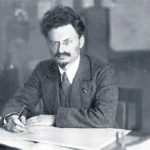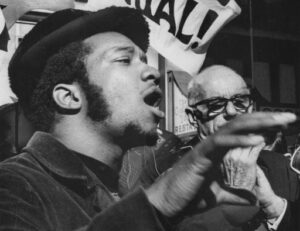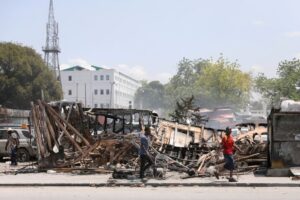As the Russian invasion of Ukraine continues, all those opposed to imperialist wars around the world should extend our solidarity to the tens of thousands of Russian people who have stood up and taken part in protests in roughly 50 cities against it. By March 6th,10,000 protesters in Russia had been arrested for protesting the war on Ukraine.
Unfortunately, not everyone in the global antiwar movement has taken a clear stance in opposition to Russia’s invasion–with many adopting the simplistic approach of “my enemy’s enemy is my friend.” But the reality of global imperialism is more complex, as larger and smaller imperialist powers joust for control to protect their individual “spheres of influence.”Russia’s invasion of Ukraine can be rightfully seen as a part of its aim to return (the currently independent) Ukraine to its sphere of influence, if not outright forcing it to become part of resurrecting the Russian Empire of old.
This is also the case among some antiwar activists in the heart of US imperialism, the world’s uncontested military superpower.Socialist Jeff Mackler, writing on behalf of the United National Antiwar Coalition, recently argued,
The Ukraine crisis has taken its toll, at least for the moment, on the still modest forces of the U.S. and international antiwar movements, with two poles emerging with counterposed strategic conceptions. In the U.S. a growing minority, perhaps a majority, feels compelled to denounce with equal fervor both sides, Russia on the one, and US/NATO on the other.
In sharp contrast, organizations representing the major antiwar coalitions demand: “No to US/NATO War in Ukraine! No wars with Russia! No sanctions! No to NATO and NATO expansion” – a central cause of the present crisis – and, “Fund human needs, education, housing, the environment & healthcare not war!”
Entirely absent in this statement is any condemnation of the actual Russian invasion of Ukraine!
But the people of Ukraine have been denied their right to independence for centuries – beginning with Tsarist Russia, then under the control of Stalin’s Soviet Union after 1928.
Below, we reprint an excerpt from an article by Russian revolutionary Leon Trotsky about Ukraine’s right to self-determination, while it remained under the rule of Stalinism, written in 1939, when the outbreak of the Second World War was imminent – which demonstrates why the right to self-determination is key to revolutionary socialism. The article was first published in Socialist Appeal in May 1939.
The Bolshevik party, not without difficulty and only gradually under the constant pressure of Lenin, was able to acquire a correct approach to the Ukrainian question. The right to self-determination, that is, to separation, was extended by Lenin equally to the Poles and to the Ukrainians. He did not recognize aristocratic nations. Every inclination to evade or postpone the problem of an oppressed nationality he regarded as a manifestation of Great Russian chauvinism.
After the conquest of power, a serious struggle took place in the party over the solving of the numerous national problems inherited from old Czarist Russia. In his capacity as People’s Commissar of Nationalities, Stalin invariably represented the most centralist and bureaucratic tendency. This evinced itself especially on the question of Georgia and on the question of the Ukraine. The correspondence dealing with these matters has remained unpublished to this day. We hope to publish a section of it – the very small section which is at our disposal. Every line of Lenin’s letters and proposals vibrates with an urge to accede as far as possible to those nationalities that have been oppressed in the past. In the proposals and declarations of Stalin, on the contrary, the tendency toward bureaucratic centralism was invariably pronounced. In order to guarantee “administrative needs,” i.e., the interests of the bureaucracy, the most legitimate claims of the oppressed nationalities were declared a manifestation of petty-bourgeois nationalism. All these symptoms could be observed as early as 1922-23. Since that time they have developed monstrously and have led to outright strangulation of any kind of independent national development of the peoples of the USSR.
The Bolshevik Conception of Soviet Ukraine
In the conception of the old Bolshevik party Soviet Ukraine was destined to become a powerful axis around which the other sections of the Ukrainian people would unite. It is indisputable that in the first period of its existence Soviet Ukraine exerted a mighty attractive force, in national respects as well, and aroused to struggle the workers, peasants, and revolutionary intelligentsia of Western Ukraine enslaved by Poland. But during the years of Thermidorian reaction [the rise of Stalin beginning in 1928], the position of Soviet Ukraine and together with it the posing of the Ukrainian question as a whole changed sharply. The more profound the hopes aroused, the keener was the disillusionment. The bureaucracy strangled and plundered the people within Great Russia, too. But in the Ukraine matters were further complicated by the massacre of national hopes. Nowhere did restrictions, purges, repressions and in general all forms of bureaucratic hooliganism assume such murderous sweep as they did in the Ukraine in the struggle against the powerful, deeply-rooted longings of the Ukrainian masses for greater freedom and independence. To the totalitarian bureaucracy, Soviet Ukraine became an administrative division of an economic unit and a military base of the USSR. To be sure, the Stalin bureaucracy erects statues to Shevchenko but only in order more thoroughly to crush the Ukrainian people under their weight and to force it to chant paeans in the language of Kobzar to the rapist clique in the Kremlin.
Toward the sections of the Ukraine now outside its frontiers, the Kremlin’s attitude today is the same as it is toward all oppressed nationalities, all colonies, and semi-colonies, i.e., small change in its international combinations with imperialist governments. At the recent 18th Congress of the “Communist Party,” Manuilsky, one of the most revolting renegades of Ukrainian communism, quite openly explained that not only the USSR but also the Comintern (the “gyp-joint,” according to Stalin’s formulation) refused to demand the emancipation of oppressed peoples whenever their oppressors are not the enemies of the ruling Moscow clique. India is nowadays being defended by Stalin, Dimitrov and Manuilsky against – Japan, but not against England. Western Ukraine they are ready to cede forever to Poland in exchange for a diplomatic agreement which appears profitable at the present time to the bureaucrats of the Kremlin. It is a far cry from the days when they went no further than episodic combinations in their politics.
Stalin, Hitler and the Ukraine
Not a trace remains of the former confidence and sympathy of the Western Ukrainian masses for the Kremlin. Since the latest murderous “purge” in the Ukraine no one in the West wants to become part of the Kremlin satrapy which continues to bear the name of Soviet Ukraine. The worker and peasant masses in the Western Ukraine, in Bukovina, in the Carpatho-Ukraine are in a state of confusion: Where to turn? What to demand? This situation naturally shifts the leadership to the most reactionary Ukrainian cliques who express their “nationalism” by seeking to sell the Ukrainian people to one imperialism or another in return for a promise of fictitious independence. Upon this tragic confusion Hitler bases his policy in the Ukrainian question. At one time we said: but for Stalin (i.e., but for the fatal policy of the Comintern in Germany) there would have been no Hitler. To this can now be added: but for the rape of Soviet Ukraine by the Stalinist bureaucracy there would be no Hitlerite Ukrainian policy.
We shall not pause here to analyze the motives that impelled Hitler to discard, for the time being at least, the slogan of a Greater Ukraine. These motives must be sought in the fraudulent combinations of German imperialism on the one hand and on the other in the fear of conjuring up an evil spirit whom it might be difficult to exorcize. Hitler gave Carpatho-Ukraine as a gift to the Hungarian butchers. This was done, if not with Moscow’s open approval then in any case with confidence that approval would be forthcoming. It is as if Hitler had said to Stalin: “If I were preparing to attack Soviet Ukraine tomorrow I should have kept Carpatho-Ukraine in my own hands.” In reply, Stalin at the 18th Party Congress openly came to Hitler’s defense against the slanders of the “Western Democracies.” Hitler intends to attack the Ukraine? Nothing of the sort! Fight with Hitler? Not the slightest reason for it. Stalin is obviously interpreting the handing over of Carpatho-Ukraine to Hungary as an act of peace.
For a free, independent Soviet Ukraine!
This means that sections of the Ukrainian people have become so much small change for the Kremlin in its international calculations. The Fourth International must clearly understand the enormous importance of the Ukrainian question in the fate not only of Southeastern and Eastern Europe but also of Europe as a whole. We are dealing with a people that has proved its viability, that is numerically equal to the population of France and occupies an exceptionally rich territory which, moreover, is of the highest strategical importance. The question of the fate of the Ukraine has been posed in its full scope. A clear and definite slogan is necessary that corresponds to the new situation. In my opinion there can be at the present time only one such slogan: A united, free and independent workers’ and peasants’ Soviet Ukraine.
This program is in irreconcilable contradiction first of all with the interests of the three imperialist powers, Poland, Rumania, and Hungary. Only hopeless pacifist blockheads are capable of thinking that the emancipation and unification of the Ukraine can be achieved by peaceful diplomatic means, by referendums, by decisions of the League of Nations, etc. In no way superior to them of course are those “nationalists” who propose to solve the Ukrainian question by entering the service of one imperialism against another. Hitler gave an invaluable lesson to those adventurers by tossing (for how long?) Carpatho-Ukraine to the Hungarians who immediately slaughtered not a few trusting Ukrainians. Insofar as the issue depends upon the military strength of the imperialist states, the victory of one grouping or another can signify only a new dismemberment and a still more brutal subjugation of the Ukrainian people, The program of independence for the Ukraine in the epoch of imperialism is directly and indissolubly bound up with the program of the proletarian revolution. It would be criminal to entertain any illusions on this score.
Soviet constitution admits right of self-determination
But the independence of a United Ukraine would mean the separation of Soviet Ukraine from the USSR, the “friends” of the Kremlin will exclaim in chorus. What is so terrible about that? – we reply. The fervid worship of state boundaries is alien to us. We do not hold the position of a “united and indivisible” whole. After all, even the constitution of the USSR acknowledges the right of its component federated peoples to self-determination, that is, to separation. Thus, not even the incumbent Kremlin oligarchy dares to deny this principle. To be sure it remains only on paper. The slightest attempt to raise the question of an independent Ukraine openly would mean immediate execution on the charge of treason. But it is precisely this despicable equivocation, it is precisely this ruthless hounding of all free national thought that has led the toiling masses of the Ukraine, to an even greater degree than the masses of Great Russia, to look upon the rule of the Kremlin as monstrously oppressive.
In the face of such an internal situation it is naturally impossible even to talk of Western Ukraine Voluntarily joining the USSR as it is at present constituted. Consequently, the unification of the Ukraine presupposes freeing the so-called Soviet Ukraine from the Stalinist boot. In this matter, too, the Bonapartist clique will reap what it has sown.
But wouldn’t this mean the military weakening of the USSR? – the “friends” of the Kremlin will howl in horror. We reply that the weakening of the USSR is caused by those ever-growing centrifugal tendencies generated by the Bonapartist dictatorship. In the event of war the hatred of the masses for the ruling clique can lead to the collapse of all the social conquests of October. The source of defeatist moods is in the Kremlin. An independent Soviet Ukraine, on the other hand, would become, if only by virtue of its own interests, a mighty southwestern bulwark of the USSR. The sooner the present Bonapartist caste is undermined, upset, crushed and swept away, the firmer the defense of the Soviet Republic will become and the more certain its socialist future.
Against imperialism and Moscow Bonapartism
Naturally an independent workers’ and peasants’ Ukraine might subsequently join the Soviet Federation; but voluntarily, on conditions which it itself considers acceptable, which in turn presupposes a revolutionary regeneration of the USSR. The genuine emancipation of the Ukrainian people is inconceivable without a revolution or a series of revolutions in the West which must lead in the end to the creation of the Soviet United States of Europe. An independent Ukraine could and “undoubtedly will join this federation as an equal member. The proletarian revolution in Europe, in turn, would not leave one stone standing of the revolting structure of Stalinist Bonapartism. In that case the closest union of the Soviet United States of Europe and the regenerated USSR would be inevitable and would present infinite advantages for the European and Asiatic continents, including of course the Ukraine too. But here we are shifting to questions of second and third order. The question of first order is the revolutionary guarantee of the unity and- independence of a workers’ and peasants’ Ukraine in the struggle against imperialist on the one hand, and against Moscow Bonapartism on the other.
For an international discussion
This appears to me the correct policy in the Ukrainian question. I speak here personally and in my own name. The question must be opened up to international discussion. The foremost place in this discussion must belong to the Ukrainian revolutionary Marxists. We shall listen with the greatest attention to their voices. But they had better make haste. There is little time left for preparation!
April 22, 1939





